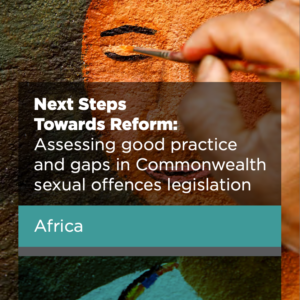Uganda’s sexual offence laws are in the Penal Code 1950 (PC) (as amended). The Criminal Procedure Code Act 1950 (CPC) applies to sexual offences and other crimes. The CPC has not been amended since its introduction and the law of procedure and evidence on sexual offences needs review to ensure it explicitly excludes a requirement for corroboration and irrelevant evidence of the complainant’s past sexual history or reputation to protect their rights.
The PC was amended in 2007 to update some sexual offences provisions, including expanding the definition of ‘defilement’ to include boys. While expanding the definition was a positive step, the use of the term ‘defilement’ is not good practice. Overall, the PC is outdated and does not conform with good practice and international standards in many areas assessed in this report. For example, marital rape and other sexual assault are not expressly criminalised. Consent is not defined to require free and voluntary agreement. Not all acts of non-consensual sexual penetration and sexual touching are criminalised and, with one exception, the crimes are not gender-neutral covering only assaults against females. Rape carries the death penalty, which is not consistent with human rights compliant good practice.
There are limited child sexual offences. The age of consent to sexual activity is 18 years for both boys and girls, but there are no close-in-age defences to protect young people under the age of consent from being prosecuted for consensual sexual activity with their peers. The PC criminalises consensual sexual activity with an intellectually disabled person regardless of their capacity to freely and voluntarily agree to sexual activity, and uses derogatory terms ‘idiots’ and ‘imbeciles’.
Uganda criminalises same-sex sexual activity. Laws that criminalise consensual same-sex sexual activity should be repealed and all non- consensual sexual acts, including anal ‘rape’, should be included in the general sexual assault provisions, such as ‘rape’ and ‘sexual assault’, as well as in child sexual offences. All of these crimes should be gender-neutral.
Uganda is a state party to relevant international and regional human rights treaties, including the Convention on the Elimination of All Forms of Discrimination against Women, Convention on the Rights of the Child, Convention on the Rights of Persons with Disabilities, International Covenant on Civil and Political Rights and Convention against Torture and Other Cruel, Inhuman or Degrading Treatment or Punishment. Uganda is also a party to the African Charter on Human and Peoples’ Rights and the Protocol to the African Charter on Human and Peoples’ Rights on the Rights of Women in Africa (Maputo Protocol).
Read more about the criminalisation of LGBT people in Uganda.
The full assessment of Uganda is available here.



